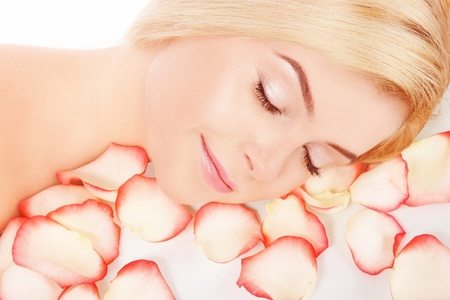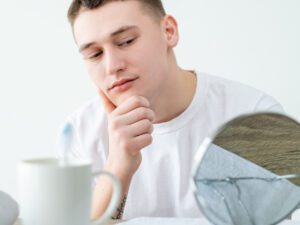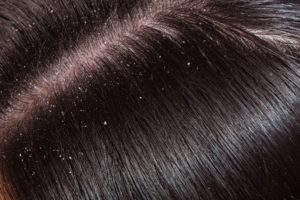As the year is quickly wrapping up many of us are longing for a bit of rest after a busy, hectic year. There never seems to be enough time in the day and a lot of people tend to reduce their sleeping time in order to accomplish more of what they have to do or what they love to do. As a result, many adults are forging on with this relentless pace with insufficient sleep. Not sleeping enough, and not sleeping well can also be the result of sleep disorders. The stresses of daily life may intrude upon our ability to sleep well, or we may have medical or mental-health conditions that disrupt our sleep. For whatever reason, the consequences of sleep deprivation in the long term have been associated with higher risk of health issues such as high blood pressure and heart disease. It is also commonly acknowledged that lack of sleep can adversely affect the way you look.
Lack of sleep and the way we look
This rather subjective finding has also been demonstrated by scientific studies. In 2013, a study in Sweden investigated the effects of sleep deprivation through facial cues, by which one recognizes that someone is sleep deprived versus not sleep deprived. The study was conducted where forty observers rated 20 facial photographs with respect to fatigue, facial cues, and sadness. The stimulus material consisted of 10 individuals photographed in the middle of the day after normal sleep and after 31 hours of sleep deprivation following a night with 5 hours of sleep.
Comparison of photos after a night of ‘normal sleep’, with photos from ‘sleep deprived’ individuals, indicated that ‘sleep deprived’ were rated as looking more fatigued, having more hanging eyelids, redder eyes, more swollen eyes, darker circles under the eyes, paler skin, more wrinkles and fine lines around the eyes, the corners of the mouth as being more droopy and more sad. However, sleep deprivation did not significantly influence the level of glazed eyes, rash/eczema or tense lips.
The findings indicate that sleep deprivation affects a number of facial characteristics or cues that observers associated with fatigue. There was also a correlation between looking fatigued and looking sad. Sleep deprived people were also rated as appearing less attractive than after experiencing a normal night’s sleep. Sleep related facial cues may also be sensitive indicators of social as well as clinical judgments and behaviour.
Lack of sleep and skin health
Whilst effect of poor sleep have been often associated with medical problems such as obesity, diabetes, cancer and immune deficiency, in 2013 a study demonstrated for the first time that sleep deprived women show signs of premature skin aging and a decrease in their skin’s ability to recover after sun exposure. The pioneering USA study looked at the effects of poor sleep on skin health and ageing using a combination of subjective and objective assessments. Thirty (30) ‘poor sleeping’ women (defined as women sleeping 5 hours or less per night), were compare to 30 ‘good sleepers’ with respect to: 1) appearance of dark circles around the eyes; 2) self-perception of attractiveness questionnaire; 3) skin barrier to recovery through Transepidermal Water Loss (TEWL) measurements, and 4) erythema recovery through skin colour measurements.
Results showed that ‘good sleepers’ had significantly lower intrinsic skin ageing scores. At baseline, ‘poor sleepers’ had significantly higher levels of TEWL, which indicates unhealthy skin conditions. Three days (72 hours) after skin barrier disruption by tape stripping, ‘good sleepers’ had 30% greater barrier recovery compared with ‘poor sleepers’. At 24 hours after exposure to ultraviolet light, ‘good sleepers’ had significantly better recovery from erythema. ‘Good sleepers’ also reported a significantly better perception of their appearance and physical attractiveness compared with ‘poor sleepers’.
This study indicated that chronic poor sleep quality is associated with increased signs of intrinsic ageing such as diminished skin barrier function and lower satisfaction with appearance. However since anecdotal evidence suggests that some wrinkles can appear slightly smoother after a fairly decent sleep, it would be interesting to measure the effects of a good sleep vs. poor sleep on number, length, depth of fine lines and wrinkles on the face. At this stage there seem to be a lack of studies in the scientific literature focusing on objective measurement of fine lines and wrinkles that have been able to prove the relationship between sleep and wrinkles.
Wise old saying
The positive effects of a good night’s sleep on facial appearance and skin would have been observed by most of us at least once in our lifetime. It’s also no surprise that many celebrities whose career is heavily dependent on appearance, have made sleeping a matter of priority and openly supported long sleeps as their health and beauty choice. “Beauty Sleep” is not just a myth but a fact, and the results of the two studies above provide the first scientific support to such concept. More studies should be conducted in this area to unlock the correlation between sleep and facial appearance. In any case, whatever your plans may be, our beauty advice for this festive season is to get plenty of rest. As USA music and beauty icon Beyoncé once said in a famous quote: “Having peace, happiness and healthiness is my definition of beauty. And you can’t have any of that without sleep.”
References:
Cues of Fatigue: Effects of Sleep Deprivation on Facial Appearance; Tina Sundelin, Mats Lekander, Göran Kecklund, Eus J. W. Van Someren, Andreas Olsson, John Axelsson; Sleep. 2013 Sep 1; 36(9): 1355–1360
Does poor sleep quality affect skin ageing?; Oyetakin-White P1, Suggs A, Koo B, Matsui MS, Yarosh D, Cooper KD, Baron ED; Clin. Exp. Dermatol. 2015 Jan; 40(1):17-22. doi: 10.1111/ced.12455. Epub 2014 Sep 30



